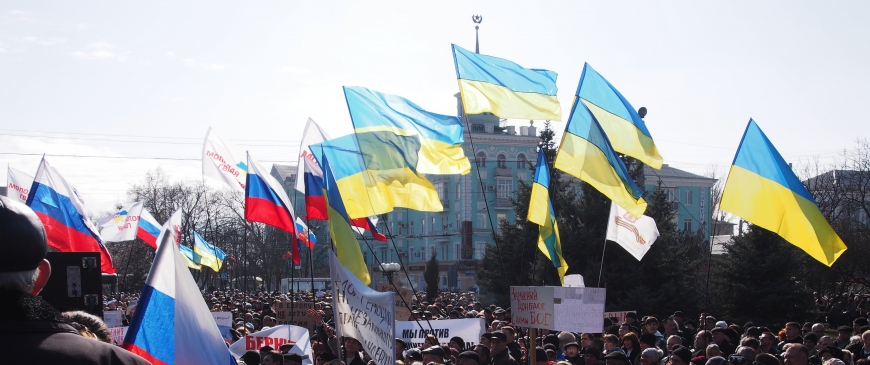
Is the EU responsible for the crisis in Ukraine?
Many of those demanding Brexit blame the EU for blundering into Ukraine and setting off a chain reaction that led to bloody civil war. They accuse EU leaders of imperial over-reach in trying to drag Ukraine into an association agreement. Thus Boris Johnson declared on 9th May: “If you want an example of EU foreign policy making on the hoof, and the EU’s pretensions to be running a defence policy, that have caused real trouble, then look at what has happened in Ukraine.”
The Russians never liked the EU’s “eastern partnership” - launched in 2008, and designed to thicken the ties between Brussels and Armenia, Azerbaijan, Belarus, Georgia, Moldova and Ukraine. They viewed the partnership, together with the association agreements and trade agreements it entailed, as a scheme to undermine their sway in Eastern Europe. There was some truth in that, but the EU cannot be held responsible for Russia’s illegal and violent response to events in Ukraine.
Within Ukraine, there was a political consensus - extending to Russian-leaning politicians like Viktor Yanukovych, president from 2010 to 2014 - in favour of negotiating both an association agreement and a trade agreement with the EU. And Russia itself was fairly relaxed about these negotiations, during the presidency of Dmitri Medvedev. At the regular EU-Russia summits, the European Commission tried to discuss the Ukraine deals and their implications for Russia, but the Russian side was not interested.
This changed when Putin returned to the Russian presidency in 2012, for a third term. He planned to turn the customs union that linked Belarus, Kazakhstan and Russia into a much grander “Eurasian Economic Union” (EEU), which he hoped would become a strategic counterweight to the EU. He needed Ukraine to give the project weight and credibility. In the spring of 2013 Putin learned that if Ukraine implemented the EU trade agreement - which would mean lowering tariffs - it could not join the EEU, which would have high common external tariffs.
So Putin started to block Ukrainian exports to Russia and threatened dire economic consequences if Yanukovych signed the deal. In November 2013 Yanukovych caved in to Russian pressure - to the surprise of the EU institutions, European governments and the Obama administration. But then it was the turn of the Russian and Ukrainian presidents to be caught unawares: the collapse of the EU deals led to a popular uprising in Kyiv, violent clashes and, in February 2014, the flight of Yanukovych.
Perhaps Putin feared that Ukraine’s new, pro-Western government would seek to join NATO. Whatever his reasoning, his troops took over the Ukrainian peninsula of Crimea which Russia then annexed. By April, anti-Kyiv rebels, backed by Russian special forces, were seizing towns in the Donbass region of Eastern Ukraine.
Western governments were once again wrong-footed, having failed to imagine that Putin could carry out such brazen and illegal acts. But although the EU should not bear responsibility for the fighting which followed, it is legitimate to ask whether Brussels should have thought harder about how Russia would respond to its deals with Ukraine. Would not more insightful analysis have helped the EU to understand that Russia was becoming very angry?
Perhaps, but two qualifications are called for. First, EU policy on Russia is driven mainly by the key national capitals, like Berlin, Paris and London. The job of the Brussels institutions is largely to implement the line set by governments. And it was the governments - and the US - which backed the eastern partnership and failed to predict how Russia would respond.
Second, an important principle was at stake. Should the EU, after improved and “insightful analysis,” have really told Kyiv: “We don’t want to provoke Putin, and nor should you, so we will scrap the deals that would have boosted your economic development by increasing trade?” To many British eurosceptics, and to “realists” who follow the Henry Kissinger school of diplomacy, the answer to that question is yes. Realists believe, as do Russia and China, that big countries have the right to establish spheres of influence in their neighbourhoods. But that world-view is incompatible with the principle, backed by most EU governments, of self-determination. If one accepts that principle, one has to allow a sovereign nation like Ukraine to choose its own foreign policy orientation.
In any case, since the fighting in the Donbass began, the EU has done a pretty good job of helping to stabilise the situation. It has forked out to keep Ukraine afloat financially, with €4 billion of macro-financial assistance committed or disbursed since the start of 2014; it has provided humanitarian aid for victims of the conflict, including displaced persons; and it has given technical assistance to help with reform, including the fight against corruption.
Furthermore - despite grumbling from some member-states - it has maintained pressure on Russia through sanctions that have deprived major state-backed Russian companies of access to capital. Without these sanctions, and the possibility that they could be strengthened, Russia might well have been tempted to take more Ukrainian territory. At its worst, the EU has occasionally looked naïve during the Ukraine crisis. But overall its performance has been respectable.
Charles Grant is director of the Centre for European Reform.
